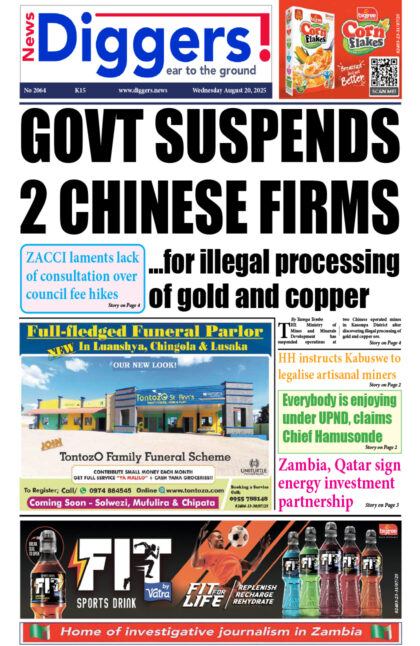THE Consumer Unity Trust Society has called on government to emulate other countries and consider slashing the Pay As You Earn (PAYE) threshold in the wake of the devastating COVID-19 pandemic.
And CUTS has urged the Zambia Revenue Authority (ZRA) to consider reducing tax rates in priority sectors to allow them to continue operating during this difficult time.
In a statement, CUTS executive director Chenai Mukumba asked government to slash the PAYE threshold.
“Across the world, COVID-19 is having a negative effect on the economy, and in the face of this crisis, one of the economic impacts we may soon start to face in Zambia is consumers having limited access to affordable, quality goods and services, particularly as countries begin to close their borders and trade is impacted. We are, therefore, urging the government to consider re-thinking the PAYE as some countries have done during this time and urge them to take more substantive action in protecting consumers by supporting particularly small, medium enterprises that are the backbone of the economy. Many low-income households are already living from hand-to-mouth and an increase in the cost of living, coupled with limited access to affordable, quality goods and services due to growing trade restrictions would exacerbate their living conditions. SMEs are also at risk due to the sudden shifts in supply and demand during this period, which is, in-turn, affecting their revenues and profits,” Mukumba stated.
“On March 27, the Minister of Finance (Dr Bwalya Ng’andu) delivered a statement on the impact of COVID-19 on the national economy. He indicated that the initial projected economic growth rate of 3.2 per cent had been revised to lower than 2 per cent amidst slowdowns in economic activity as a result of the disruptive effects of the COVID-19 global pandemic. He further added that macro-economic aggregates, such as inflation, were projected to remain above the targeted 6-8 per cent range, and that the Zambian kwacha, trading at ZMW17.80 per dollar, was going to continue to weaken against the dollar, mainly due to capital flight in international financial markets and a persistence in poor copper prices due to a drop in demand from China.”
And Mukumba also recommended that the ZRA should lower income tax rates to mitigate the negative effects of the inflation rate as well as allow consumers to play a role in stimulating the economy.
“With regards to tax relief, we commend government for suspending excise duty on imported ethanol as this will make sanitizers and other medicine-related activities affordable for consumers. Reducing the provisions of SI 90 will also reduce the cost of production for local producers. However, we urge the ZRA to also consider reducing tax rates in priority sectors to allow them to continue operating during this difficult time. We also recommend that the ZRA consider reducing income tax rates to mitigate the negative effects of the inflation rate as well as allow consumers to play a role in stimulating the economy. Across the world, COVID-19 is having a negative effect on the economy and in the face of this crisis, one of the economic impacts we may soon start to face in Zambia is consumers having limited access to affordable, quality goods and services. We encourage government to be proactive and look into ways to ensure that this does not happen,” Mukumba stated.
“In as much as it is hard to determine how long this situation will be, Zambia’s road to recovery will be highly dependent on how proactive government will be in its response. In order to address some of the negative impacts of COVID-19, the Minister of Finance announced a number of measures. While government has set up a preliminary COVID-19 Contingency and Response Plan and an Epidemic Preparedness Plan under the Ministry of Health, government has also put in place a number of liquidity and tax relief measures. While these are, indeed, positive first steps, we urge government to consider more substantial steps towards increasing liquidity within the market and providing tax relief measures.”
Meanwhile, Mukumba noted that more steps needed to be taken in addition to those already outlined in the national budget to support the domestic private sector.
“The Minister of Finance indicated that they would be looking to reduce domestic arrears as well as outstanding arrears to pensioners, while positive, similar measures were outlined in the 2020 national budget speech. In light of COVID-19, therefore, we urge government to consider further steps than those already determined in the national budget to support the domestic private sector. While releasing K2.5 billion is welcome, it is important to note that as of September 2019, Zambia’s domestic arrears stood at K26.2 billion,” stated Mukumba.
The world’s leading economies have quickly moved to approve emergency financing to their respective economies in the wake of the COVID-19 outbreak.
In early March, the British government approved an unprecedented economic stimulus packages to shore up its economy, with an estimated US $459 billion, or around 16 per cent of that country’s annual national income, to go towards various sectors of its economy.
























